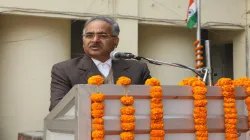History taught to inform about facts, not to make schools battleground, says NCERT Director
Backing the decision of the National Council of Educational Research and Training (NCERT) to make changes in the textbooks, Director Dinesh Saklani argued that they want to create positive citizens not violent and depressed individuals.

Amid the accusations of the saffronoisation of the NCERT curriculum triggered by the changes in textbooks, council’s director Dinesh Prasad Saklani on Sunday denounced such claims and said that the history is taught to the students to know about facts, not to make the school a battleground.
On the modification of the reference to the Bari masjid demolition and Gujarat riots in textbooks, Saklani argued that teaching about riots can create violent and depressed citizens and said that the changes in the textbooks are part of the revision and should not be a subject of “hue and cry.”
While interacting with PTI, he said, “Why should we teach about riots in school textbooks? We want to create positive citizens not violent and depressed individuals".
No hue and cry over 1984 riots removal: Saklani
"Should we teach our students in a manner that they become offensive, create hatred in society or become victim of hatred? Is that education's purpose? Should we teach about riots to such young children ... when they grow up, they can learn about it but why school textbooks. Let them understand what happened and why it happened when they grow up. The hue and cry about the changes is irrelevant," he added.
Meanwhile, he said that the same hue and cry is not made about the 1984 riots which is also excluded from the textbooks.
Notably, the reference to the Ram Mandir issue in the Class 12 political science book has been changed from this year. The new textbook finds no mention of the Babri Masjid but a reference to it as a "three-domed structure". Also, the Ayodhya section has been reduced to two pages which was hitherto mentioned in four pages.
Moreover, it focuses on the Supreme Court judgement that paved the way for the construction of the Ram temple at the site. On the inclusion of the Supreme Court’s judgement in the Ram Janmbhoomi case, Saklani argued that if it had given a verdict in favour of Ram temple, Babri masjid or Ram Janmabhoomi, should it not be included in our textbooks? Adding that they have included the new updates.
He drew parallels with the construction of a new parliament and said, “If we have constructed new Parliament, should our students not know about it. It is our duty to include the ancient developments and recent developments.”
Nonetheless, Saklani further said, "We want to create positive citizens and that's what is the purpose of our textbooks. We cannot have everything in them. The purpose of our education is not to create violent citizens ... depressed citizens. Hatred and violence are not subjects of teaching, they should not be focus of our textbooks".
Chnaging irrelevant thing is not saffronisation, says Saklani
Asked about allegations of saffronisation of curriculum and ultimately textbooks, Saklani said, "If something has become irrelevant ... it will have to be changed. Why shouldn't it be changed. I don't see any saffronisation here. We teach history so students know about facts, not for making it a battleground".
"If we are telling about Indian Knowledge System, how can it be saffronisation? If we are telling about iron pillar in Mehrauli and saying Indians were way ahead of any metallurigical scientist, are we saying wrong? How can it be saffronisation?"
Meanwhile, he also said that making changes in the textbooks is a global exercise and there is a process of changing subject matter which is decided by subjects and pedagogy experts. He said that he can not dictate the changes from the top and everything is based on facts and evidence.
He added that the NCERT is revising the curriculum of the school textbooks in line with the National Education Policy (NEP) 2020.
(With PTI Inputs)
ALSO READ | NCERT books tweaked, references to PoK, Babri Masjid, Gujarat riots changed | DETAILS